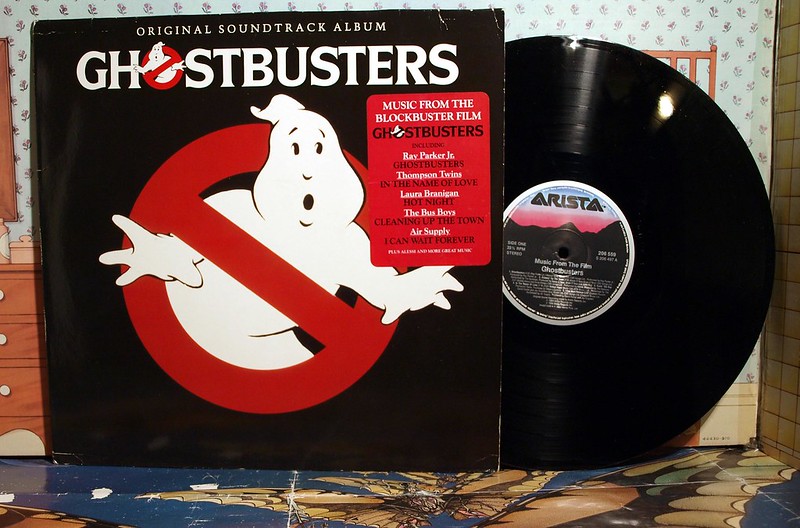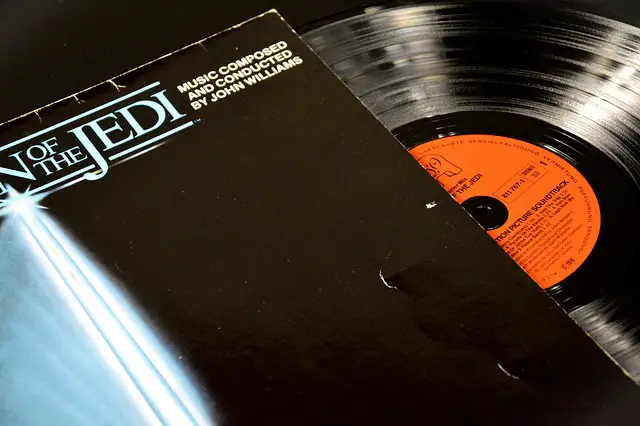A score typically refers to the original instrumental music created specifically for a movie, TV show, or video game, whereas a soundtrack generally includes any music used in a production, including pre-existing songs or licensed music.
What is a soundtrack?
(Photo By badgreeb RECORDS on Flickr)

A soundtrack is the collection of music, dialogue, and sound effects used in a film or other media project. Typically, it includes pre-existing songs or licensed tracks that are chosen to fit the mood or theme of a scene.
The use of popular music in films can have a powerful emotional impact on viewers. For example, remember how “My Heart Will Go On” by Celine Dion added an extra layer of emotion to Titanic’s already heart-wrenching scenes?
In addition to licensed songs, soundtracks may also include original compositions created specifically for the project. These compositions can be instrumental pieces with no lyrics or full-fledged pop songs.
Soundtrack albums are often released after a film’s release as a way to capitalize on its popularity and generate additional revenue. They offer fans the opportunity to relive their favorite moments from the movie through music.
Soundtracks play an important role in setting the tone and enhancing storytelling in visual media projects.
What is a score?
(Image by studiobmedia from Pixabay )

A score is a musical composition specifically written to accompany visual media, often film or television. Unlike a soundtrack, which features pre-existing songs and recordings, scores are composed from scratch with the film’s narrative in mind.
A score typically consists of instrumental music that enhances the mood and emotions conveyed by each scene. It can range from soaring orchestral pieces to minimalist electronic compositions. The goal is always to create an immersive audio-visual experience for the viewer.
The creation of a score involves close collaboration between the composer and filmmakers. The composer must take into account things like pacing, character development, and plot twists when crafting their music.
Scores can be just as memorable as any hit song or iconic movie theme. From John Williams’ epic themes for Star Wars and Indiana Jones to Hans Zimmer’s haunting melodies for Inception and Interstellar, scores have become an integral part of our cultural lexicon.
A good score should enhance the story being told on screen without overpowering it. When done right, it becomes an essential component of what makes films truly great works of art.
Score Vs. Soundtrack – Key differences
When it comes to creating music for movies, two terms that are often used interchangeably are “score” and “soundtrack”. Although they may seem similar, there are distinct differences between the two.
A score is a musical composition created specifically for a film or TV show. It is meant to enhance the emotional impact of the scenes and help tell the story. The score is typically composed by one person, sometimes with input from the director or producer.
On the other hand, a soundtrack refers to any music used in a film or TV show. This can include songs performed by various artists that fit with certain scenes or moods. Soundtracks can also feature pre-existing instrumental pieces that were not originally composed for the movie.
The key difference between scores and soundtracks is their purpose within a production. Scores serve as an integral part of storytelling while soundtracks simply provide additional background music.
Another important distinction between scores and soundtracks is how they’re created. As mentioned earlier, scores are usually composed by one individual while soundtracks involve collaboration between multiple artists and record labels.
Although both scores and soundtracks play important roles in enhancing visual media productions’ emotional impacts on audiences through music; it’s essential to recognize their fundamental differences in creative intent and collaborative process among composers/producers/artists involved in its creation
The different types of scores
There are different types of scores that filmmakers use to enhance their visual storytelling. The type of score chosen for a film is often influenced by the genre, mood, and themes of the movie.
One common type of score is the orchestral score. This type of score uses traditional instruments like violins, cellos, and brass to create a grandiose sound that can range from epic to emotional. Orchestral scores are most commonly used in action-adventure films or dramas.
Another popular type of score is electronic music. This style utilizes synthesizers and digital sounds to create a futuristic or otherworldly ambiance. It’s ideal for science fiction movies or thrillers where suspenseful music plays a critical role in building tension.
In contrast, some movies opt for more unconventional music genres like jazz or rock n’ roll. These unique choices add personality and flavor to the film’s soundtrack while still tying into its plot.
There’s also minimalistic scoring which consists mostly of ambient sounds with occasional musical accents that help emphasize key moments in the story without overwhelming it with too much noise.
Ultimately, choosing what kind of score your project needs requires careful consideration based on your vision as well as audience expectations.
The different types of soundtracks
Soundtracks come in different shapes and sizes, just like scores. The type of soundtrack you choose will depend on the project you are working on.
One type of soundtrack is a compilation album. This is where various artists’ songs are put together to create a cohesive collection that fits with the theme of the movie or TV show. These soundtracks can be incredibly popular, as they often include hit songs from well-known musicians.
Another type of soundtrack is an original soundtrack, which includes music specifically composed for the film or TV show. This can add an extra layer of depth to the production and help immerse viewers into its world.
There are also instrumental soundtracks that feature no lyrics but instead rely solely on music to convey emotion and mood. These types of soundtracks can be particularly effective in creating tension or suspense in horror movies or dramatic scenes.
There are video game soundtracks which play an important role in immersing players into virtual worlds by setting moods and emotions through music cues that engage them even further into gameplay experience.
Choosing the right soundtrack for your project involves consideration not only genre-wise but also what message do you want to relay?
How to choose the right score or soundtrack for your project
Choosing the right score or soundtrack for your project is crucial to its success. The music can set the tone and enhance the emotions of a scene, so it’s important to choose wisely.
Consider the genre of your project. If you’re making a horror movie, you’ll want a dark and eerie soundtrack that will leave your audience feeling uneasy. On the other hand, if you’re creating a romantic comedy, you may want to opt for light-hearted and upbeat scores.
Think about how much dialogue there is in your project. If there’s minimal dialogue, then having an impactful score can help convey emotion and fill in any gaps in storytelling. However, if there’s an abundance of dialogue and sound effects already present in your production then choosing a more subtle background track might be appropriate.
Know where to look for options. There are many websites out there that offer royalty-free tracks which makes them great money-saving alternatives over hiring composers or buying expensive licenses.
Trust Your instincts! Ultimately trust yourself when it comes down o making creative decisions like selecting music for yor ptoject as no one knows what better suits YOU than yourself!
Who creates music scores?
Typically, this task falls upon composers – musicians who specialize in creating and arranging musical pieces for use in visual media. These individuals have a deep understanding of how music works, and their knowledge allows them to create soundscapes that perfectly match the mood and tone of individual scenes.
Many composers work freelance, offering their services out to production companies looking for high-quality musical content. Others may work directly for specific studios or networks on an ongoing basis.
Regardless of where they work, though, one thing remains constant – the importance of hiring someone with experience and skill when it comes to crafting music scores. With so much riding on these compositions in terms of audience engagement and emotional response, there’s simply no room for error!








